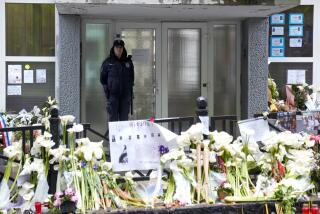U.N. Official Proposes Weapons-Free Bosnian Capital
- Share via
SARAJEVO, Bosnia-Herzegovina — The U.N. commander in Bosnia on Monday proposed removing all soldiers and heavy weapons--even those monitored by the United Nations--from Sarajevo and the surrounding area.
The proposal by Lt. Gen. Michael Rose appeared aimed at avoiding a repeat of Friday’s Serbian seizure of heavy weapons that were put under U.N. guard after NATO demanded in February that the guns around Sarajevo be removed.
The seizure provoked a NATO air strike on an archaic Serbian antitank weapon south of Sarajevo, an attack designed to show Bosnia’s Serbs that the United Nations has the power to use force.
After the air strike, the Serbs returned the weapons they had seized. Rose now apparently wants to build on the Serbs’ new sense of isolation to get weapons out of Sarajevo and the 12.5-mile weapons exclusion zone that the North Atlantic Treaty Organization imposed around the city.
Serbia pledged Thursday to cut off all military supplies and trade with the Bosnian Serbs because they rejected an international peace plan reducing their share of Bosnia from 70% to 49% and giving the rest to a Muslim-Croatian federation.
Rose said Monday that Serbia’s pledge could have “catastrophic” effects on the ability of the Bosnian Serbs to fight and maintain the military superiority they have enjoyed during the 28-month war.
It will take two to three months for the full impact of the closure of the border with Serbia and Montenegro, the two remaining republics in Yugoslavia, to be felt, Rose said.
But “the (Bosnian) Serbs are feeling increasingly isolated,” he said, reporting that their military headquarters is now unable to call Belgrade, the Serbian capital.
However, Bosnia’s Serbs still have Sarajevo in their grip. The international airlift of aid has been shut down for more than two weeks following presumed Serbian fire on planes. The Serbs have also closed the only land routes into and out of the city.
The aid airlift will resume today, U.N. spokesman Ron Redmond said in Geneva. It started again Friday but was halted again by the Serbian seizure of weapons.
Rose said the Serbs felt justified in tightening the siege because the Bosnian army broke a cease-fire agreement with offensives elsewhere in Bosnia. He said the United Nations protested to Bosnian President Alija Izetbegovic about the offensives.
Rose contended that both the government and Serbs would benefit from the demilitarization of the Sarajevo area, noting that 40% of the people in the region are on Serbian-held territory. Under the proposal, he said, both armies would withdraw from the zone, and the only local security forces would be police with handguns.
But on Monday the Bosnian Serbs raised a new obstacle to any lasting peace: Momcilo Krajisnik, speaker of the self-styled Bosnian Serb assembly, demanded 64% of Bosnia for the Serbs.
Bosnian Serbs, who constituted about one-third of Bosnia’s population before the war and tended to live more in rural areas, claim that is the amount of territory Serbs rightfully owned in Bosnia.
Krajisnik argued that the 49% offered by the international peace plan translated into only about 20% of Bosnia’s economic assets.
The Serbs went to war after the Muslims and Croats moved to secede from Serb-dominated Yugoslavia. An estimated 200,000 people are dead or missing in the conflict.
“Serbs are for peace, but peace based on Serb ownership of 64% of the former Bosnia-Herzegovina, and their right to self-determination according to accepted international standards,” Krajisnik said.
The Bosnian Serbs are to vote on the peace plan Aug. 27-28.
Also Monday, the Red Cross confirmed that Bosnian Serbs have rounded up more than 100 Muslim men recently and taken them to a labor camp at Lopare in northeast Bosnia.
The Serbs have also expelled more than 300 Muslim women, children and elderly men from the northeastern town of Bijeljina in the past three weeks, Peter Kessler of the Office of the U.N. High Commissioner for Refugees said.
More to Read
Sign up for Essential California
The most important California stories and recommendations in your inbox every morning.
You may occasionally receive promotional content from the Los Angeles Times.










